- Home
- Tennessee Williams
The Glass Menagerie
The Glass Menagerie Read online
The Glass Menagerie
Tennessee Williams
No play in the modern theatre has so captured the imagination and heart of the American public as Tennessee Williams’s The Glass Menagerie. Menagerie was Williams’s first popular success and launched the brilliant, if somewhat controversial, career of our pre-eminent lyric playwright. Since its premiere in Chicago in 1944, with the legendary Laurette Taylor in the role of Amanda, the play has been the bravura piece for great actresses from Jessica Tandy to Joanne Woodward, and is studied and performed in classrooms and theatres around the world. The Glass Menagerie (in the reading text the author preferred) is now available only in its New Directions Paperbook edition. A new introduction by prominent Williams scholar Robert Bray, editor of The Tennessee Williams Annual Review, reappraises the play more than half a century after it won the New York Drama Critics Circle Award: “More than fifty years after telling his story of a family whose lives form a triangle of quiet desperation, Williams’s mellifluous voice still resonates deeply and universally.” This edition of The Glass Menagerie also includes Williams’s essay on the impact of sudden fame on a struggling writer, “The Catastrophe of Success,” as well as a short section of Williams’s own “Production Notes.” The cover features the classic line drawing by Alvin Lustig, originally done for the 1949 New Directions edition.
THE GLASS MENAGERIE,
by Tennessee Williams, 1944
Character Profiles
Amanda Wingfield. Amanda Wingfield is the mother of Tom and Laura. Amanda spent her youth in the south, and in a way she continues to live there, endlessly telling her children stories of her life back in those days. Her desire to live in the past is perhaps not surprising, given that it was so much more enjoyable than the life she has in the present-living on limited means in an apartment in a rundown area of St. Louis.
Amanda’s husband deserted her sixteen years ago, and she is scared that Tom will turn out like his father. But she does not realize that by her constant attempts to manage his life for him, she is driving him away. Amanda is resourceful and energetic, and her sole ambition is that her son and daughter should be successful and happy. But her attempts to marry off Laura to Jim are a terrible failure and leave her desolate, although she still manages to put a brave face on things.
Laura Wingfield. Laura Wingfield is Amanda’s daughter. She is an extremely shy young woman in her early twenties. Following a childhood illness she is crippled, and wears a leg brace. Laura is so withdrawn, so unable to make contact with reality, that she spends her time playing with her collection of glass animals and listening to gramophone records. The failure of her encounter with Jim makes her even more withdrawn. Tennessee Williams wrote of her, “she is like a piece of her own glass collection, too exquisitely fragile to move from the shelf.”
Tom Wingfield. Tom Wingfield is the narrator of the play as well as a character in it. He is Amanda’s son and Laura’s brother. Tom is a poet, and he feels stifled by his unrewarding job at the warehouse and the tense situation at home, where he is always quarreling with his controlling mother. He wants to escape his situation, just as his father managed to escape many years before. His goal is to join the merchant marine, and he is prepared to be ruthless in accomplishing his goal – for example, paying his dues to the seaman’s union with the money that should have been used to pay the electricity bill. But even though he does manage to leave the family home, he does not find happiness. As he travels from city to city, he cannot forget the sister he left behind.
Jim O’Connor. Jim O’Connor is a friend of Tom’s from the warehouse where they both work. Tennessee Williams describes him in his notes to the play as “A nice, ordinary young man.” Jim is the “gentleman caller” who is invited to dinner by Tom, and in whom Amanda places her hopes for finding a husband for Laura.
Jim was an outstanding success in high school, and everyone thought he would succeed in life. However, in the six years that have elapsed since he graduated, he has found life much tougher than he might have expected. At the warehouse, he is a shipping clerk, which is only a slightly better position than Tom’s. However, Jim is a cheerful, optimistic young man, who is determined to get on in life. He is studying public speaking and radio engineering at night school, and wants to go into the fledgling television industry. When he visits the Wingfield family, Jim does his best to draw Laura out of her shell, but his enthusiasm runs away with him and he makes the mistake of kissing her. He then has to explain that he must disappoint her because he has a steady girlfriend named Betty.
Scene: An alley in St. Louis.
Time: Past and Now[1]
SCENE 1
[The Wingfield apartment is in the rear of the building, one of those vast hive-like conglomerations of cellular living-units that flower as warty growths in overcrowded urban centres of lower-middle-class population and are symptomatic of the impulse of this largest and fundamentally enslaved section of American society to avoid fluidity and differentiation and to exist and function as one interfused mass of automatism.
The apartment faces an alley and is entered by a fire-escape, a structure whose name is a touch of accidental poetic truth, for all of these huge buildings are always burning with the slow and implacable fires of human desperation. The fire-escape is included in the set – that is, the landing of it and steps descending from it.
The scene is memory and is therefore non-realistic. Memory takes a lot of poetic licence. It omits some details; others are exaggerated, according to the emotional value of the articles it touches, for memory is seated predominantly in the heart. The interior is therefore rather dim and poetic.
At the rise of the curtain, the audience is faced with the dark, grim rear wall of the Wingfield tenement. This building, which runs parallel to the footlights, is flanked on both sides by dark, narrow alleys which run into murky canyons of tangled clothes-lines, garbage cans, and the sinister lattice-work of neighbouring fire-escapes. It is up and down these alleys that exterior entrances and exits are made, during the play. At the end of Tom’s opening commentary, the dark tenement wall slowly reveals (by means of a transparency) the interior of the ground floor Wingfield apartment.
Downstage is the living-room, which also serves as a sleeping-room for Laura, the sofa is unfolding to make her bed. Upstage, center, and divided by a wide arch or second pro-scenium with transparent faded portières (or second curtain), is the dining-room. In an old fashioned what-not in the living-room are seen scores of transparent glass animals. A blown-up photograph of the father hangs on the wall of the living-room, facing the audience, to the left of the archway. It is the face of a very handsome young man in a doughboy’s First World War cap. He is gallantly smiling, ineluctably smiling, as if to say “I will be smiling forever”.
The audience hears and sees the opening scene in the dining-room through both the transparent fourth wall of the building and the transparent gauze portières of the dining-room arch. It is during this revealing scene that the fourth wall slowly ascends out of sight. This transparent exterior wall is not brought down again until the very end of the play, during Tom’ s final speech.
The narrator is an undisguised convention of the play. He takes whatever licence with dramatic convention is convenient to his purpose.
TOM enters dressed as a merchant sailor from alley, stage left, and strolls across the front of the stage to the fire-escape. There he stops and lights a cigarette. He addresses the audience.]
TOM: Yes, I have tricks in my pocket, I have things up my sleeve. But I am the opposite of a stage magician. He gives you illusion that has the appearance of truth. I give you truth in the pleasant disguise of illusion.
To begin with, I turn back time. I reverse it t
o that quaint period, the thirties, when the huge middle class of America was matriculating in a school for the blind. Their eyes had failed them or they had failed their eyes, and so they were having their fingers pressed forcibly down on the fiery Braille alphabet of a dissolving economy.
In Spain there was revolution. Here there was only shouting and confusion.
In Spain there was Guernica[2]. Here there were disturbances of labour, sometimes pretty violent, in otherwise peaceful cities such as Chicago, Cleveland, Saint Louis…
This is the social background of the play.
[MUSIC]
The play is memory.
Being a memory play, it is dimly lighted, it is sentimental, it is not realistic.
In memory everything seems to happen to music. That explains the fiddle in the wings.
I am the narrator of the play, and also a character in it. The other characters are my mother Amanda, my sister Laura and a gentleman caller who appears in the final scenes.
He is the most realistic character in the play, being an emissary from a world of reality that we were somehow set apart from. But since I have a poet’s weakness for symbols, I am using this character also as a symbol; he is the long-delayed but always expected something that we live for. There is a fifth character in the play who doesn’t appear except in this larger-than-life-size photograph over the mantel.
This is our father who left us a long time ago. He was a telephone man who fell in love with long distances; he gave up his job with the telephone company and skipped the light fantastic out of town… The last we heard of him was a picture postcard from Mazatlan, on the Pacific coast of Mexico, containing a message of two words – “Hello – Good-bye!” and no address.
I think the rest of the play will explain itself …
[AMANDA’s voice becomes audible through the portières.
LEGEND ON SCREEN: “Où SONT LES NEIGES”[3].
He divides the portieres and enters the upstage area.
AMANDA and LAURA are seated at a drop-leaf table. Eating is indicated by gestures without food or utensils. AMANDA faces the audience. TOM and LAURA are Seated is profile.
The interior has lit up softly and through the scrim we see AMANDA and LAURA seated at the table in the upstage area]
AMANDA [calling] Tom?
TOM: Yes, Mother.
AMANDA: We can’t say grace until you come to the table!
TOM: Coming, Mother. [He bows slightly and withdraws, reappearing a few moments later in his place at the table.]
AMANDA [to her son]: Honey, don’t push with your fingers. If you have to push with something, the thing to push with is a crust of bread. And chew! Chew! Animals have sections in their stomachs which enable them to digest flood without mastication, but human beings are supposed to chew their food before they swallow it down. Eat food leisurely, son, and really enjoy it. A well-cooked meal has lots of delicate flavours that have to be held in the mouth for appreciation. So chew your food and give your salivary glands a chance to function!
[TOM deliberately lays his imaginary fork down and his chair back from the table.]
TOM: I haven’t enjoyed one bite of this dinner because of your constant directions on how to eat it. It’s you that makes me rush through meals with your hawk-like attention to every bite I take. Sickening – spoils my appetite – all this discussion of – animals’ secretion – salivary glands – mastication!
AMANDA [lightly]: Temperament like a Metropolitan star! [He rises and crosses downstage.] You’re not excused from the table.
TOM: I’m getting a cigarette.
AMANDA: You smoke too much.
[LAURA rises.]
LAURA: I’ll bring in the blancmangé.
[He remains standing with his cigarette by the portières during the following.]
AMANDA [rising]: No, sister, no, sister – you be the lady this time and I’ll be the darkey
LAURA: I’m already up.
AMANDA: Resume your seat, little sister, I want you to stay fresh and pretty for gentleman callers!
LAURA: I’m not expecting any gentleman callers.
AMANDA [crossing out to kitchenette. Airily]: Sometimes they come when they are least expected! Why, I remember one Sunday afternoon in Blue Mountain –[Enters kitchenette.]
TOM: I know what’s coming
LAURA: Yes. But let her tell it.
TOM: Again?
LAURA: She loves to tell it.
[AMANDA returns with bowl of dessert.]
AMANDA: One Sunday afternoon in Blue Mountain, your mother received seventeen! gentlemen callers! Why, sometimes there weren’t chairs enough to accommodate them all. We had to send the nigger over to bring in folding chairs from the parish house.
TOM [remaining at portières]: How did you entertain those gentleman callers?
AMANDA: I understood the art of conversation!
TOM: I bet you could talk.
AMANDA: Girls in those days knew how to talk, I can tell you.
TOM: Yes?
[IMAGE: AMANDA AS A GIRL ON A PORCH GREETING CALLERS.]
AMANDA: They knew how to entertain their gentlemen callers. It wasn’t enough for a girl to be possessed of a pretty face and a graceful figure although I wasn’t alighted in either respect. She also needed to have a nimble wit and a tongue to meet all occasions.
TOM: What did you talk about?
AMANDA: Things of importance going on in the world! Never anything coarse or common or vulgar. [She addresses Tom as though he were seated in the vacant chair at the table though he remains by portieres. He plays this scene as though he held the book.]My callers were gentleman – all! Among my callers were some of the most prominent young planters of the Mississippi Delta – planters and sons of planters!
[Tom motions for music and a spot of light on AMANDA. Her eyes lift, her face glows, her voice becomes rich and elegiac.
SCREEN LEGEND: “Où SONT Les NEIGES”]
There was young Champ Laughlin who later became vice-president of the Delta Planters Bank. Hadley Stevenson who was drowned in Moon Lake and left his widow one hundred and fifty thousand in Government bonds.
There were the Cutrere brothers, Wesley and Bates. Bates was one of my bright particular beaux! He got in a quarrel with that wild Wainwright boy. They shot it out on the floor of Moon Lake Casino. Bates was shot through the stomach. Died in the ambulance on his way to Memphis. His widow was also well provided for, came into eight or ten thousand acres, that’s all. She married him on the rebound – never loved her – carried my picture on him the night he died! And there was that boy that every girl in the Delta had set her cap for! That brilliant, brilliant young Fitzhugh boy from Greene County!
TOM: What did he leave his widow?
AMANDA: He never married! Gracious, you talk as though all of my old admirers had turned up their toes to the daisies!
TOM: Isn’t this the first you’ve mentioned that still survives?
AMANDA: That Fitzhugh boy went North and made a fortune – came to be known as the Wolf of Wall Street! He had the Midas touch, whatever he touched turned to gold! And I could have been Mrs. Duncan J. Fitzhugh, mind you! But – I picked your father!
LAURA [rising]: Mother, let me clear the table.
AMANDA: No, dear, you go in front and study your typewriter chart. Or practise your shorthand a little. Stay fresh and pretty! It’s almost time for our gentlemen callers to start arriving. [She flounces girlishly toward the kitchenette.] How many do you suppose we’re going to entertain this afternoon?
[Tom throws down the paper and jumps up with a groan.]
LAURA [alone in the dining-room]: I don’t believe we’re going to receive any, Mother.
AMANDA [reappearing, airily]: What? Not one – not one? You must be joking!
[LAURA nervously echoes her laugh. She slips in a fugitive manner through the half-open portières and draws them in gently behind her. A shaft of very clear light is thrown on her face against the faded tapestry of the cu
rtains.]
[MUSIC: “THE GLASS MENAGERIE” UNDER FAINTLY. Lightly.]
Not one gentleman caller? It can’t be true! There must be a flood, there must have been a tornado!
LAURA: It isn’t a flood, it’s not a tornado, Mother. I’m just not popular like you were in Blue Mountain. … [Tom utters another groan. LAURA glances at him with a faint, apologetic smile. Her voice catching a little.]Mother’s afraid I’m going to be an old maid.
[THE SCENE DIMS OUT WITH “GLASS MENAGERIE”]
[Music]
SCENE 2
[“Laura Haven’t you Ever Liked Some Boy?” On the dark stage the screen is lighted with the image of blue roses.]
[Gradually LAURA’s figure becomes apparent and the screen goes out. The music subsides. LAURA is seated in the delicate ivory chair at the small claw-foot table. She wears a dress of soft violet material for a kimono – her hair tied back from her forehead with a ribbon. She is washing and polishing her collection of glass. AMANDA appears on the fire-escape steps. At the sound of her ascent, LAURA catches her breath, thrusts the bowl of ornaments away and seats herself stiffly before the diagram of the typewriter keyboard as though it held her spellbound. Something has happened to AMANDA. It is written in her face as she climbs to the landing: a look that is grim and hopeless and a little absurd.
She has on one of those cheap or imitation velvety-looking cloth coats with imitation fur collar. Her hat is five or six years old, one of those dreadful cloche hats that were worn in the late twenties and she is eloping an enormous black patent-leather pocketbook with nickel clasps and initials. This is her full-dress outfit, the one she usually wears to the D.A.R.[4] Before entering she looks through the door. She purses her lips, opens her eyes very wide, rolls them upward, and shakes her head. Then she slowly lets herself in the door. Seeing her mother’s expression LAURA touches her lips with a nervous gesture.]

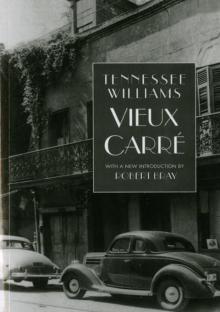 Vieux Carre
Vieux Carre The Night of the Iguana
The Night of the Iguana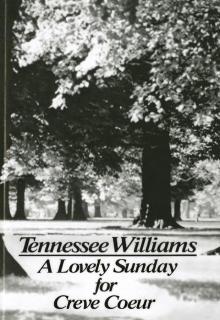 A Lovely Sunday for Creve Coeur
A Lovely Sunday for Creve Coeur Sweet Bird of Youth
Sweet Bird of Youth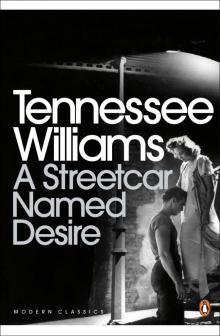 Streetcar Named Desire
Streetcar Named Desire The Milk Train Doesn't Stop Here Anymore
The Milk Train Doesn't Stop Here Anymore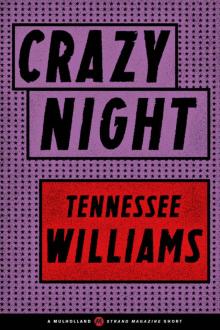 Crazy Night
Crazy Night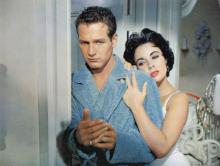 Three Plays of Tennessee Williams
Three Plays of Tennessee Williams A House Not Meant to Stand
A House Not Meant to Stand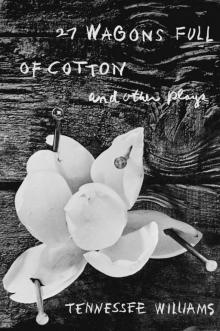 27 Wagons Full of Cotton and Other Plays
27 Wagons Full of Cotton and Other Plays Tales of Desire
Tales of Desire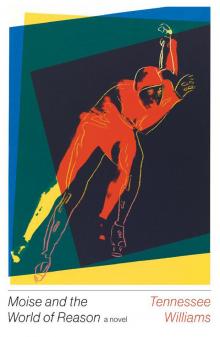 Moise and the World of Reason
Moise and the World of Reason The Traveling Companion & Other Plays
The Traveling Companion & Other Plays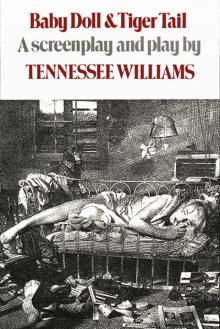 Baby Doll Tiger Tail: A Screenplay and Play by Tennessee Williams
Baby Doll Tiger Tail: A Screenplay and Play by Tennessee Williams Memoirs
Memoirs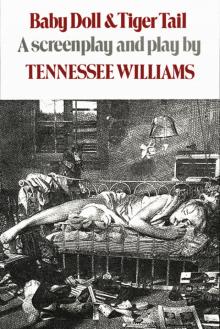 Baby Doll & Tiger Tail
Baby Doll & Tiger Tail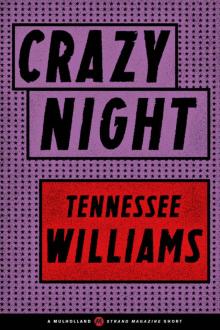 Crazy Night (A Mulholland / Strand Magazine Short)
Crazy Night (A Mulholland / Strand Magazine Short)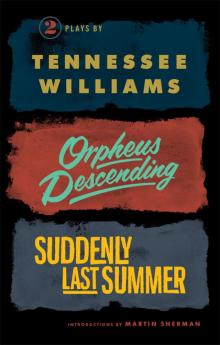 Orpheus Descending and Suddenly Last Summer
Orpheus Descending and Suddenly Last Summer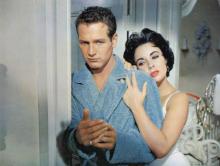 Three Plays
Three Plays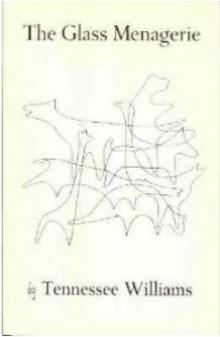 The Glass Menagerie
The Glass Menagerie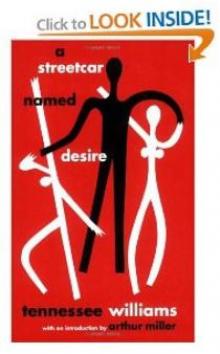 A Streetcar Named Desire
A Streetcar Named Desire